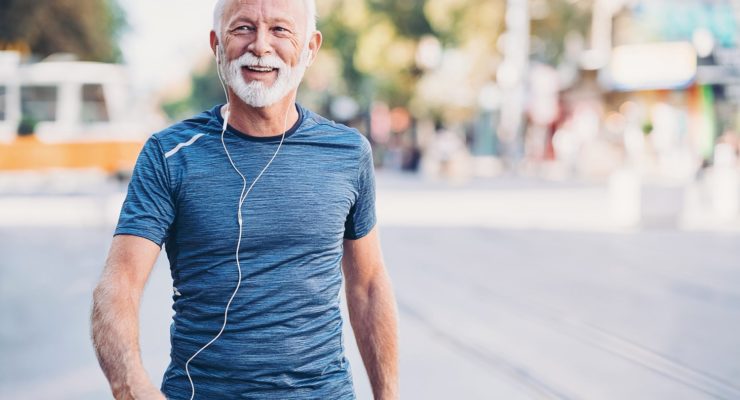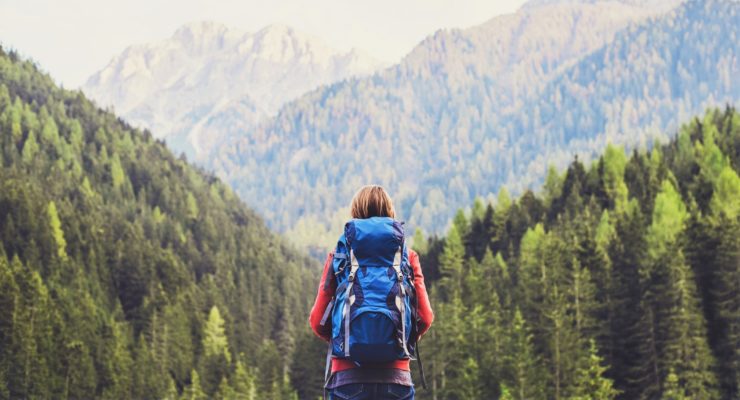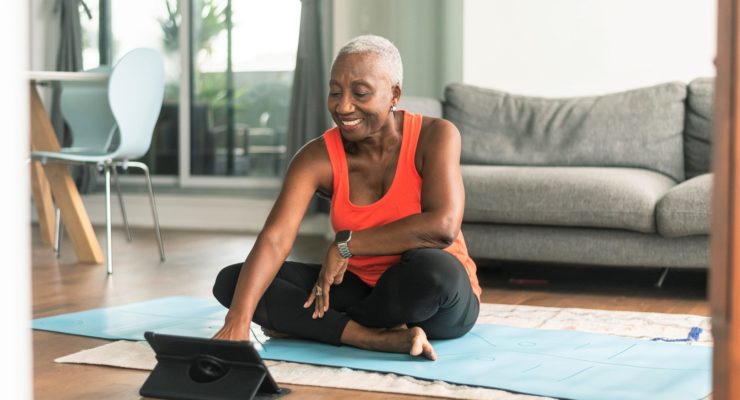Riding a bicycle is the fun way to get in the daily activity that we all need. Biking heats up your metabolism, helps you look fitter and feel better and speeds your weight loss progress—all while you enjoy the relaxing rhythm of pedaling. Whether you hit the streets, a trail or stay indoors on a stationary cycle, riding a bike helps you get slimmer and healthier. Check out the health benefits of cycling below!
Does Biking Burn Calories?

On Nutrisystem, we recommend 30 minutes of physical activity per day. At a moderate pace of about 12 miles per hour, a 155-pound person burns approximately seven calories a minute while cycling (about 210 calories in 30 minutes), says Harvard Health Publishing. As you build up your strength and stamina, you can try riding up hills to burn off even more.
Cycling for Weight Loss: Shedding Pounds

Cycling helps you lose weight faster than walking, according to a study, published in the American Journal of Sports Medicine. Over a six-month period, overweight women who cycled regularly dropped more pounds than those who walked for exercise.
Body Toner

The first difference you’re likely to notice when you start to ride consistently is that your legs and backside are becoming firmer and shapelier, because they are working hardest when you pedal. Balancing on a bike activates your other core muscles—including the abdominal muscles in your belly—so they’ll get toned, too. Bonus: As your body gradually converts fat to muscle, your resting metabolism will increase, burning more calories even when you’re sitting down.
Is Cycling Good Cardio?

Cycling, like other aerobic activities, works your heart and lungs so they grow stronger, which helps protect you from heart disease, high blood pressure, stroke and much more. You may feel winded when you first start bicycling but after a few rides, your body will adjust and soon you’ll hardly notice when you’re breathing hard.
Low Impact Exercise

As we get older and carry extra pounds, pressure increases on our hips, lower back and knees. This can cause them to be sore after weight-bearing exercise, such as running or even walking. When you’re cycling, you aren’t pounding on your joints or spine, so you get the benefits of physical activity without lasting pain.
Set the Pace

Riding a bike lets you decide how much effort is right for you. Even when you pedal at a leisurely pace, you burn calories, build muscle and strengthen your heart and lungs. As you get stronger, you can pick up the pace and amp up your metabolism.
Outdoor Time

When you’re cruising outside on a bike, you soak up the sunshine, enjoy fresh air and take in the soothing sights and sounds of nature. You also get a healthy dose of vitamin D, which your body makes when you’re exposed to sunlight. Vitamin D plays a role in keeping your metabolism active. According to Healthline, “Studies show that a higher body mass index and body fat percentage are associated with lower blood levels of vitamin D.”
Indoor Cycling Classes

You can get the weight loss benefits of cycling even if you don’t have a safe place to ride or feel comfortable balancing a bike. Stationary bikes bring the experience inside your home, a gym or studio. Spin-cycling classes—in person or online—let you join along with others for motivation and support.
Family Fun

We all need a break from our screens these days and a group bike ride is the perfect way for the whole family to get away and spend active time together. Toddlers can come along in a child’s seat or in a cart that attaches to an adult bike (used kid trailers are often available at reasonable prices in online marketplaces). Children old enough to pedal can practice their skills and keep up with a tow bar attachment that links with an adult bike. When you all ride together, kids learn healthy habits and adults stay motivated to get in their daily activity. That puts everyone on the path to their healthiest lives.
Find Your Fit

If you haven’t ridden a bike in years (or ever), start by making sure you have a good fit. You should be able to sit on the seat and hold on to the handlebars in an upright position. If you are sitting too high or leaning too far forward as you ride, you may feel pain in your back, knees or backside, says Harvard Health Publishing. For most people, the seat should be level with the handlebar stem (the point where the handlebars meet the bike’s frame). Your local bike shop can help you set up your bike for your build.
Choices with Purpose

If you’re thinking of buying a new bike, you’ll find many styles to pick from based on what kind of riding you plan to do. Basic cruisers are for casual rides on the street or smooth paths. They are simple, with foot brakes for easy stopping, wide tires for stability and no gears to change. When you’re ready for more serious rides, you can check out road bikes, which come with “drop” handlebars and thin tires that let you build up speed. Mountain bikes are heavier and equipped with thicker, knobbier tires that are designed for rolling on dirt trails. Both typically have hand brakes and gears that allow you to adjust the pedaling resistance based on the terrain. New “electric” bikes give you an assist when you’re pedaling, so you can go farther and climb steeper hills
Pick a Path

Sharing the road with cars and trucks can make being on a bike feel risky, especially when you’re just building your skills. Sidewalks may be safer but they can be uneven compared to many roads, giving you a bumpier ride. Many communities now have dedicated bike paths where you can ride separated from motor vehicles. Local parks are another safe option. If you must ride on a street with traffic, be sure to wear bright orange or yellow so drivers will see you. Wherever you ride, put on a helmet—it will help protect you from a potential head injury if you take an unexpected spill.
Start Flat

Take your first few rides on paths that are as level as possible, so you can build up your strength, balance and control of the bike. As you gain experience, try going up a few hills to challenge yourself. Once you climb a hill, you get to enjoy the smile-inducing fun of rolling downhill with the wind in your face. That’s a kind of pleasure you can never get from just walking.
How to Ride a Bike the Right Way
Bikes offer an amazing combination of things we all want and need: heart-healthy exercise, basic transportation, and perhaps most important, fun. Remember the sense of freedom and possibility you felt when you were a kid and you hopped on your bike? It’s all still there. There’s no need to be all fancy and make like a Tour de France rider, especially if you’re just looking to take a spin. Here are some basic tips to make your rides safe and fun:
- Tune It Up: Make sure your bike is ready for you. You can take it to a local bike shop and ask for a basic tune up, or do a few basic things yourself. First, make sure the tires are properly inflated. Check on the sidewall of the tire for the recommended inflation—the numbers in front of the letters “PSI.” Use a bike pump with a pressure gauge to reach the right number. Next, check the brakes to make sure everything is working properly. Finally, straddle the bike and make sure you can safely and comfortably put your feet on the ground before heading out.
- Wear a Helmet: It may have felt great as a kid to let the breeze blow back your hair, but safety trumps style. Wear a properly-fitting helmet, and buckle the strap.
- Ride With the Traffic: A bicycle is a vehicle, and has the same rights and responsibilities on the road as a car. If you’re riding on the road, pedal with the traffic. Stay to the right, and obey all traffic signs and laws. If you’re riding on recreation paths or trails, use common sense: stay to the right, announce your presence to runners and walkers, and share the space.
- Enjoy!: Remember, you’re out for fun and some exercise. There’s no need to race. Find a comfortable pace and enjoy the scenery and the motion!
Pair your exercise routine with a healthy meal delivery service. Learn more about Nutrisystem! >
The post Bike Your Way to a Healthier You: The Health Benefits of Cycling for Weight Loss appeared first on The Leaf.
from The Leaf https://leaf.nutrisystem.com/health-benefits-of-cycling-for-weight-loss/





Post a Comment